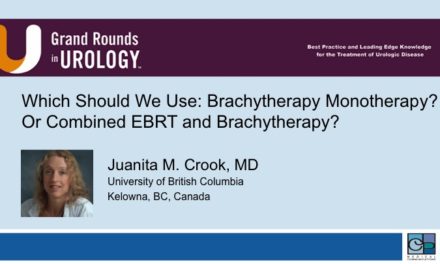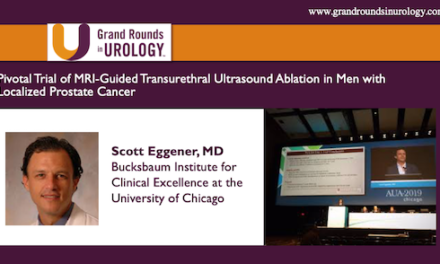Thomas J. Pugh, MD, presented “Next Generation Prostate Brachytherapy for Ablation” during the 19th Annual Future Directions in Urology Symposium on August 11, 2018 in Colorado Springs, Colorado.
How to cite: Pugh, Thomas J. “Next Generation Prostate Brachytherapy for Ablation” August 11, 2018. Accessed [date today]. https://grandroundsinurology.com/next-generation-prostate-brachytherapy-for-ablation/
Next Generation Prostate Brachytherapy for Ablation- Summary
Thomas J. Pugh, MD, provides an overview of next generation techniques, especially prostate brachytherapy, to refine dose escalation and differentiation, as well as the therapeutic ratio, for ablating localized prostate cancer.
Brachytherapy for Localized Prostate Cancer
Radiation dose intensification impacts biochemical progression-free survival, as well as rate of local failure, in localized prostate cancer. Recent evidence also suggests that dose intensification reduces the rate of distant metastases.
Prostate brachytherapy is one of the most impactful techniques for dose escalation. The ASCENDE-RT trial compared an external beam radiation therapy (EBRT) boost with a low-dose rate LDR prostate brachytherapy boost in high- and intermediate-risk prostate cancer. Results showed that the LDR prostate brachytherapy had doubled the improvement in progression-free survival compared to EBRT.
Tools that can further refine the therapeutic ratio and dose escalation for localized prostate cancer include multiparametric MRI and novel PET radiotracer imaging. Prostate brachytherapy, as well as integration of novel systemic therapies and antiandrogen therapy, can enable dose differentiation. Overall, improvements in these next generation techniques allow physicians to better treat prostate cancer patients.
About Dr. Pugh
Dr. Pugh is the Vice Chair of Clinical Affairs and Associate Professor of Radiation Oncology at the University of Colorado. As a board-certified radiation oncologist with a specific interest and specialization in prostate brachytherapy, he has expert knowledge in this next generation technique.
About the Future Directions in Urology Symposium
The Future Directions in Urology Symposium (FDUS) is an annual collaborative meeting with a faculty consisting of the top researchers, physicians, and educators in the field of urology. During FDUS, experts provide updates on recent developments and debate innovative management approaches in genitourinary cancers and urologic conditions. Subsequently, the experts devise consensus statements in accordance with the discussions held in the meeting.
In this video, Dr. Pugh discloses the thesis of the discussion he led during FDUS.
ABOUT THE AUTHOR
Dr. Pugh is an Associate Professor of Radiation Oncology and Vice Chair of Clinical Affairs at the University of Colorado Anschutz Medical Campus in Denver. He is a board-certified radiation oncologist specializing in cancers of the genitourinary tract, including malignancies of the prostate, urinary bladder, testicle, and kidney. Dr. Pugh moved to the University of Colorado Cancer Center from the MD Anderson Cancer Center in Houston, where he had been a faculty member for over five years.
Dr. Pugh obtained his undergraduate degree from the University of Kansas, which he attended on a basketball scholarship. He was one of seven athletes nationally to be awarded a post-graduate scholarship by the national collegiate athletic association (NCAA) for academic and athletic achievement. He obtained his medical degree from the University of Colorado and spent a year as an internal medicine intern at the University of Colorado Hospital. He completed his residency training in Radiation Oncology at the University of Colorado Hospital, where he served as Chief Resident. He completed a prostate brachytherapy fellowship at the Seattle Prostate Institute in Seattle, Washington, sponsored by the American Brachytherapy Society. Dr. Pugh’s interests include advanced technology integration into cancer therapeutics, prostate brachytherapy, particle therapy including proton beam therapy, image-guided radiation therapy (IGRT), stereotactic body radiotherapy (SBRT), intensity modulated radiotherapy (IMRT), and integration of medical therapeutics, including chemotherapy and hormone therapy, with radiation therapy. His research has focused on improving quality of life and reducing side effects for men with prostate cancer. In addition to his interest in technical advances in radiation oncology, he is involved in the development of cancer treatment clinical trials for patients with genitourinary cancers.
Dr. Pugh is an internationally recognized expert in genitourinary cancer and has served in numerous leadership roles on multiple ASTRO, ABS, and RTOG/NRG committees. He has served as principal investigator on several institutional and national clinical trials, including MDACC 2012-1003, MDACC 2012-1013, RTOG 0815, RTOG 1115, and MDACC 2013-0555. He has published over 100 peer-reviewed articles, abstracts, and book chapters.




